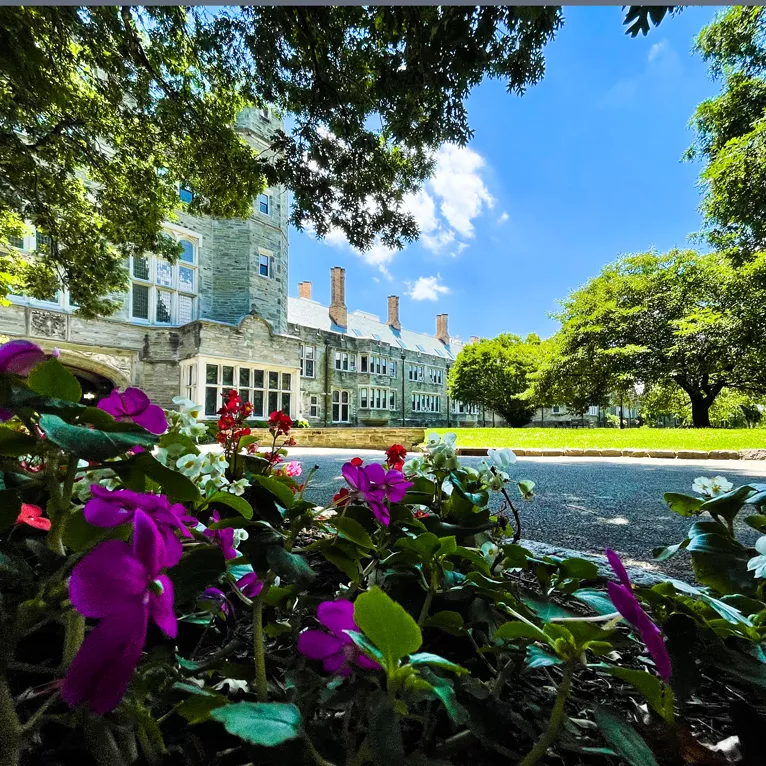Courses
This page displays the schedule of Bryn Mawr courses in this department for this academic year. It also displays descriptions of courses offered by the department during the last four academic years.
For information about courses offered by other Bryn Mawr departments and programs or about courses offered by Haverford and Swarthmore Colleges, please consult the Course Guides page.
For information about the Academic Calendar, including the dates of first and second quarter courses, please visit the College's calendars page.
Students must choose a major subject and may choose a minor subject. Students may also select from one of seven concentrations, which are offered to enhance a student's work in the major or minor and to focus work on a specific area of interest.
Concentrations are an intentional cluster of courses already offered by various academic departments or through general programs. These courses may also be cross-listed in several academic departments. Therefore, when registering for a course that counts toward a concentration, a student should register for the course listed in her major or minor department. If the concentration course is not listed in her major or minor department, the student may enroll in any listing of that course.
Spring 2026 PCST
(Class schedules for this semester will be posted at a later date.)
Fall 2026 PCST
(Class schedules for this semester will be posted at a later date.)
Spring 2027 PCST
(Class schedules for this semester will be posted at a later date.)
2025-26 Catalog Data: PCST
EDUC B275 Emergent Multilingual Learners in U.S. Schools
Fall 2025
This course, offered as both an elective as well as a course required for students pursuing secondary teaching certification in Pennsylvania through the Bi-Co Education Program, operates from a heteroglossic and culturally and linguistically sustaining stance that has four intersecting aims. First, the course seeks to support students in a critical self-examination of the ways that language has shaped their lives and learning, particularly in the context of racism, linguicism, ethno- and euro-centrism, marginalization and austerity in schools and society. Second, students investigate the ways that both historical and contemporary educational policy concerning the education of EMLLs in the United States has operated from a monoglossic orientation that has limited programmatic and pedagogical options within the classroom to those that fail to address the lived realities and needs of this growing population of students. Third, students collaboratively research and present their findings on heteroglossic classroom language practices that, in contrast to those above, respect and leverage students' community cultural wealth and full linguistic repertoires. Fourth, students, drawing upon these findings as well as research on multiple language and literacy acquisition, hone their skills as curriculum designers and pedagogues, working to address EMLLs' diverse strengths and needs in mainstream classrooms and other educational settings. All four aims are bolstered by weekly fieldwork opportunities to learn with and from EMLLs and their educators in the Philadelphia area. Lottery Preference(s): 1. EDUC majors and Certification students; 2. EDUC minors; 3. then by seniority
Cross-Cultural Analysis (CC)
Power, Inequity, and Justice (PIJ)
Counts Toward: Child and Family Studies; Peace Justice and Human Rights.
HIST B200 The Atlantic World 1492-1800
Not offered 2025-26
The aim of this course is to provide an understanding of the way in which peoples, goods, and ideas from Africa, Europe. and the Americas came together to form an interconnected Atlantic World system. The course is designed to chart the manner in which an integrated system was created in the Americas in the early modern period, rather than to treat the history of the Atlantic World as nothing more than an expanded version of North American, Caribbean, or Latin American history.
POLS B141 Introduction to International Politics
Fall 2025
This course offers an introduction to international politics to acquaint students with major trends and themes in international relations and global affairs. The course is divided into two units. The first unit explores the foundational concepts and theories and the history of international relations. The second unit focuses on key issues in international relations, such as the rise of populism & authoritarianism, international organizations, global peace & security initiatives, human rights, and forced migration. Throughout the semester, students will be asked to connect these theories and topics to issues that are playing out in the world today. This course is a pre-requisite for other International Politics courses within the Pol Sci department.
Counts Toward: Peace Justice and Human Rights.
RUSS B237 Crime or Punishment: Russian Narratives of Incarceration
Fall 2025
This course explores Russian narratives of incarceration, punishment, and captivity from the 17th century to the present day and considers topics such as social justice, violence and its artistic representations, totalitarianism, witness-bearing, and the possibility of transcendence in suffering. Taught in English. No knowledge of Russian language/culture necessary. Open to all.
Writing Attentive
Critical Interpretation (CI)
Inquiry into the Past (IP)
Counts Toward: Peace Justice and Human Rights.
SOCL B350 Movements for Social Justice
Fall 2025
Throughout human history, powerless groups of people have organized social movements to improve their lives and their societies. Powerful groups and institutions have resisted these efforts in order to maintain their own privilege. Some periods of history have been more likely than others to spawn protest movements. What factors seem most likely to lead to social movements? What determines their success/failure? We will examine 20th and 21st-century social movements to answer these questions. Prerequisite: At least one prior social science course or permission of the instructor.
Power, Inequity, and Justice (PIJ)
Counts Toward: Gender Sexuality Studies; Peace Justice and Human Rights.

Contact Us
Alison Cook-Sather
Director of Peace, Conflict, and Social Justice Studies
Bryn Mawr College
101 N. Merion Avenue
Bryn Mawr, PA 19010-2899
Phone: 610-526-5396
acooksat@brynmawr.edu